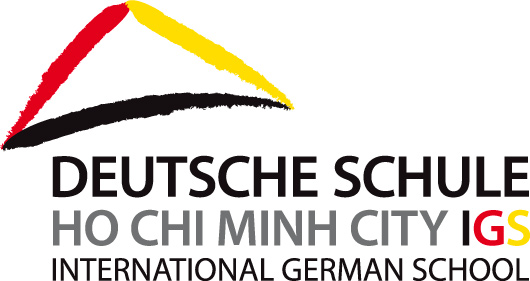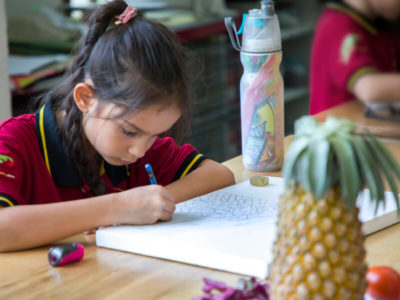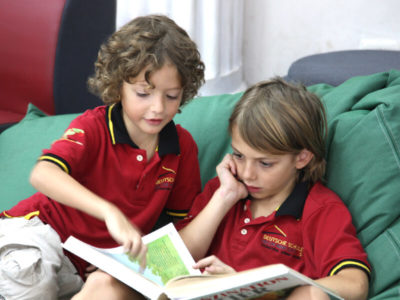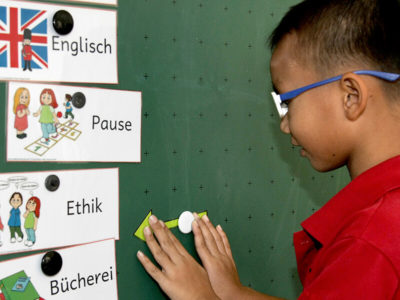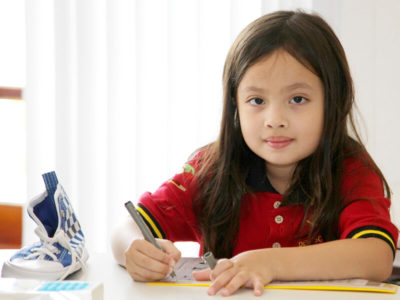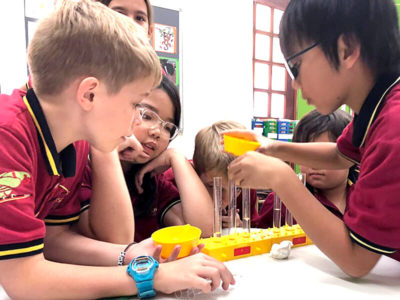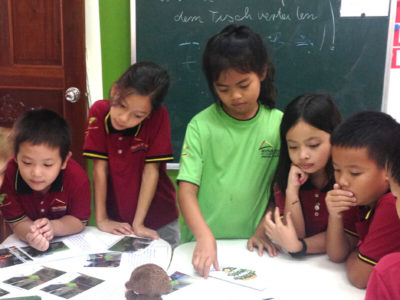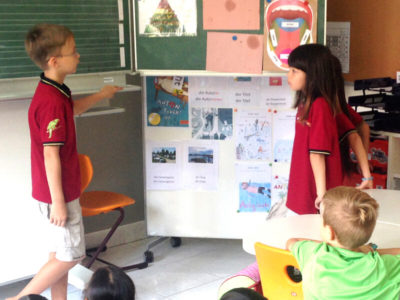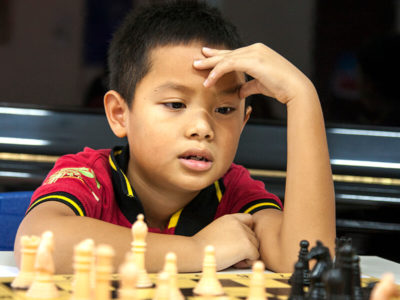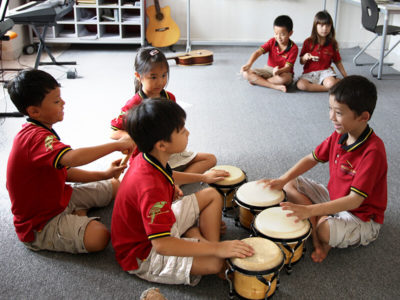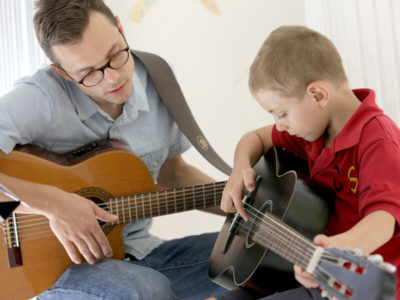PRIMARY LEVEL
Dear parents
After preschool, the children enter primary school at the age of 6.
In the four years that follow, the children acquire basic attitudes, forms of learning, and working skills as well as competencies in subject matters and language.
Subjects
WHICH REQUIREMENTS FOR ADMISSION EXIST?
- 6th birthday before August 15th
- Confirmation of readiness for school (school entry test)
- Minimal German language requirements are A1 (oral only)
- Age appropriate first language skills
Lateral entry into the individual years during the school year is possible if educational requirements are met.
WHICH CURRICULA ARE THE BASIS FOR INSTRUCTION?
Primary education is based on German curricula. These are based on the curricula of the federal state of Thuringia and are implemented by native-speaking teachers. Additional focal points of natural sciences and the promotion of creativity are an integral part of teaching.
The programme is bilingual (German, English). Selected subjects, eg ICT, are taught in English. There the children are already mastering simple programming tasks with great enthusiasm.
DO PUPILS RECEIVE REPORTS?
Grades 1 / 2:
Written report at half year and end of year
Grades 3 / 4:
Reports with marks at half year and end of year, plus verbal assessment at the end of year
WHAT HAPPENS ONCE PRIMARY SCHOOL HAS BEEN COMPLETED?
After four years of primary school, the children are placed in the orientation level (grades 5 / 6). During this time, students have the opportunity to orientate themselves with regard to the requirements of the different types of schools.
Upon completion of grade 6, IGS will give a written school career recommendation (Hauptschule, Realschule, Gymnasium) on request.
WHAT DOES A TYPICAL DAY IN PRIMARY SCHOOL LOOK LIKE?
Many children use the school bus service to get to school in the morning. Older learners often prefer bicycles. The school day starts at 7:45 hrs. Until 7:55 hrs, there is time to talk to friends and teachers or to quickly buy a notebook in the school office.
The first lesson usually starts at 8:00 hrs with the class teacher in the classroom. Learning islands, reading corners, solution counters and other rooms are available to the children as learning locations. All classrooms are equipped with WiFi. Language LearningApps, interactive textbooks, audio pens and translation programmes are integrated into the classroom.
The school day is rhythmised and thus ensures a balanced strain on your child. For example, sport follows mathematics lessons or art follows natural sciences. One lesson lasts 45 minutes. Lessons are mixed in with breaks during which children can borrow table games, sports equipment or books, as well as by breakfast, lunch, and afternoon snacks. Decent table manners are just as important to us as a healthy and appetising school meal. In grade 1, children are introduced to these social traditions by their form teacher.
After specialised instruction, students have the options to take part in after-school actitivies, to complete their homework or to attend additional classes until 16:15 hrs. Visualisation is important to us. Therefore we organise excursions – for example to the sea in Vung Tau, to the ice rink or a traditional ceramics factory.
WHAT OUR LEARNERS SAY ABOUT SPECIFIC CLASSES AT IGS
LANGUAGE COMPETENCE THROUGH BILINGUAL TEACHING
“I am like a dictionnary on two legs. If my German teacher doesn’t know an English word, then she simply asks me.“
[Freddie, grade 4, 2nd year of learning German]
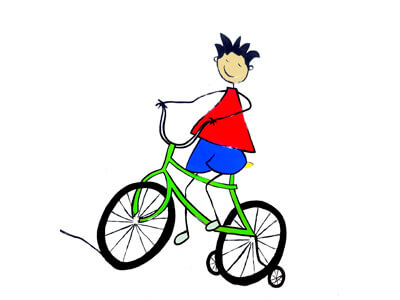
CREATIVITY AND “THINKING OUTSIDE THE BOX”
“We do super cool stuff in art. We have drawn our dream house. Our topic is architecture. If we’re lucky, we will be able to redo our bear with graffiti.“
[Freddie, grade 4, 2nd year of learning German]
“We have learnt many ways of drawing and painting more easily. I developed my imagination and invented my own animals.”
[Wesley, grade 4, 2nd year of learning German]
“Charles Avery invented his own island. Everything which he saw and thought, he took to the island in his imagination. He created models of his imaginary animals.”
[Wesley, grade 4, 2nd year of learning German]
RHETORICAL SKILLS DURING PRESENTATION LESSONS
“I really like the presentation lessons because you can tell the other kids what you already know. And then they know that, too.“
[Freddie, grade 4, 2nd year of learning German]
“The good thing is that you learn things which you don’t know yet. I am sometimes a bit afraid that I may say the wrong things. But I know all the kids in primary school and then it’s not embarrassing if that should happen.”
[Aaron, grade 4]
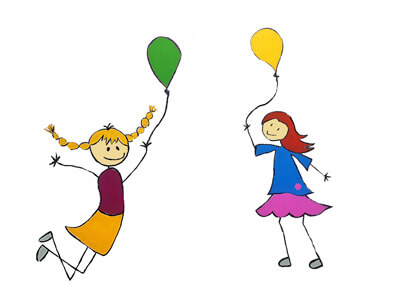
CAUSAL THINKING IN EARLY SCIENCE LESSONS
“In natural science we played with sound which we couldn’t see but they vibrated so fast.“
[Connar, grade 4]
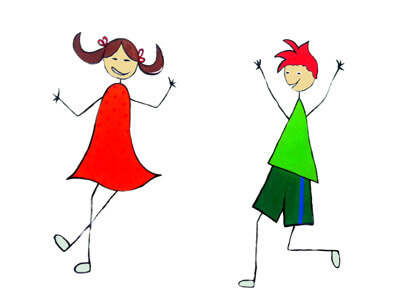
READING COMPETENCE THROUGH ANTOLIN-PROGRAMME DURING LIBRARY HOURS
“I find it great that I can bring my own books for library hours. The questions of Antolin are sorted according to caps. You can decide whether you want to pick difficult (red) or easy (blue) tasks.“
[Aaron, grade 4]

SPECIAL TALENTS IN EXTRACURRICULAR ACTIVITIES
“In the after-school activity “Healthy Cooking” I learned to use healthy sugars. I love sweet stuff.“
[Jule, grade 4]
“My coach taught me how to run as fast as possible with a ball. I learnt that because we have a real coach.“
[Aaron, grade 4]
“In the after-school activity “Healthy Cooking“ we learn how to make healthy food. We bake biscuits with sugar which we made ourselves. I love this after-school activity because we use cashews. I love cashews. Above all it is great to be cooking together.“
[Connar, grade 4]
HOW TO OBTAIN INFORMATION AS PARENTS / GUARDIANS?
- Information talks prior to registration
- Parent evenings at the beginning of the school year
- Parent-teacher conference at half-term
- Consulation hours with teachers
- Parent letters, newsletters, website, Facebook
REGISTRATION
Are you convinced that IGS is the right school for your child?
Send us your registration conveniently online. We look forward to hearing from you.
